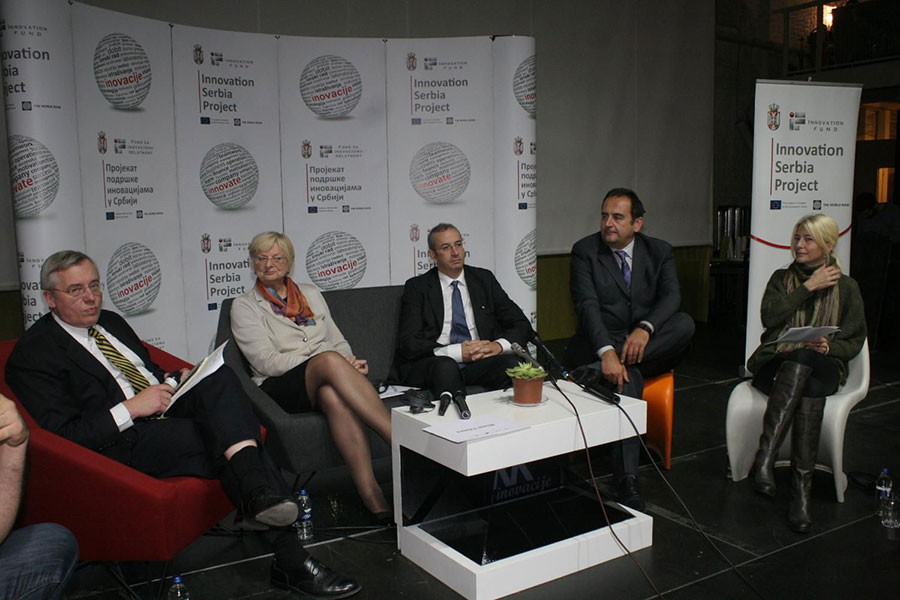As the four-year long Serbia Innovation Project closes this month, its awardees – Serbian entrepreneurs and their innovations – remain incorporated in Serbia’s innovative ecosystem, already effectively contributing to the development of Serbia’s new innovative economy.
This is the immediate legacy of the first ever concerted effort of the Serbian Government, the European Union Delegation and the World Bank to develop instruments and programs dedicated to promoting enterprise innovation in our country and establishing lasting institutional infrastructure essential to the development of a high-tech knowledge-based society in Serbia.
The Innovation Fund has been implementing the Innovation Serbia Project since 2011. The project in total value of EUR 8.4 million has been funded by the EU through the IPA funds, and administered by the World Bank.
Innovative startups and technology-intensive enterprises have been supported within the framework of this project under its two pilot programs – the Mini and Matching grant schemes, designed to provide necessary funding for project development during the research and development phase.
During four calls for proposals for the Mini and Matching Programs, the Innovation Fund and its international evaluation committee had the opportunity to evaluate nearly 500 projects from across Serbia. They mostly came from hi-tech industries such as ICT, energy efficiency and nanotechnologies, but also more traditional industries such as food and agriculture, machine and mechanical engineering, and electromechanical device production.
Seventeen companies have generated revenue from the sale or lease of their innovative products, nine have established international cooperation, while two companies have secured distributors for the US market. In order to protect their intellectual property, companies have submitted 26 international patent applications, i.e. 33 on the national level, together with 10 trademark applications, and six applications for protecting the work of authorship. Eighteen companies have established new business cooperation or partnerships.
Annual revenue of awarded companies has increased from EUR 6.21m to EUR 10.09 m – over 60% growth in the period of three years. Exports increased from EUR 0.59 m to EUR 3.10 m EUR.
The number of employees in companies whose projects the Innovation Fund had supported has grown from 156 at the end of 2011 to 432 at the end of 2014.
Especially strong growth has been noticed in Mini Grants startups – revenue growth from EUR 0.5m to EUR 3.45m, export growth from EUR 0.12m to EUR 1.55 m and more than 231 new jobs created in these enterprises over a period of three years.
“I should like to congratulate the Innovation Fund and the Ministry of Education, Science and Technological Development on the successful implementation of the EU-funded Serbia Innovation Project. This project has set new standards in the use of European Union funding to boost innovation, research and growth. We strongly hope that the Serbian Government will continue to support the Innovation Fund and the business and research communities, enabling them to become even more competitive, generate growth and create new jobs in Serbia”, said Michael Davenport, Head of the EU Delegation in Serbia.
An additional component of the Innovation Serbia Project focused on encouraging selected research and development institutes (RDIs) to engage in technology transfer and commercialization, and assisting in formulating RDI sector reform policy.
“Through the Bank team’s work with the research sector, we have seen a growing interest from the research community in upgrading the R&D institutional processes and increasing capacity to innovate and transfer technologies out of research institutes and into the market.
The Serbia Innovation Project has been a successful pilot effort. Based on international practice and experience, continued long-term commitment (including financing) by the Serbian authorities and long-term support of stakeholders in the academic and private sector will be critical to the continued development of a knowledge-based economy in Serbia”, said Tony Verheijen, the World Bank Country Manager for Serbia.
Building on the successes of the ISP, the Innovation Fund has been assigned with the implementation of the joint project of the Ministry of Education, Science and Technological Development, the European Union and the World Bank – Serbian Research, Innovation and Technology Transfer Project – intended to further boost research and development and innovation in Serbia and to pilot a system of technology transfer from the academic community to the private sector in order to foster a knowledge-based economy.
For details about the awarded projects please visit http://www.inovacionifond.rs/




